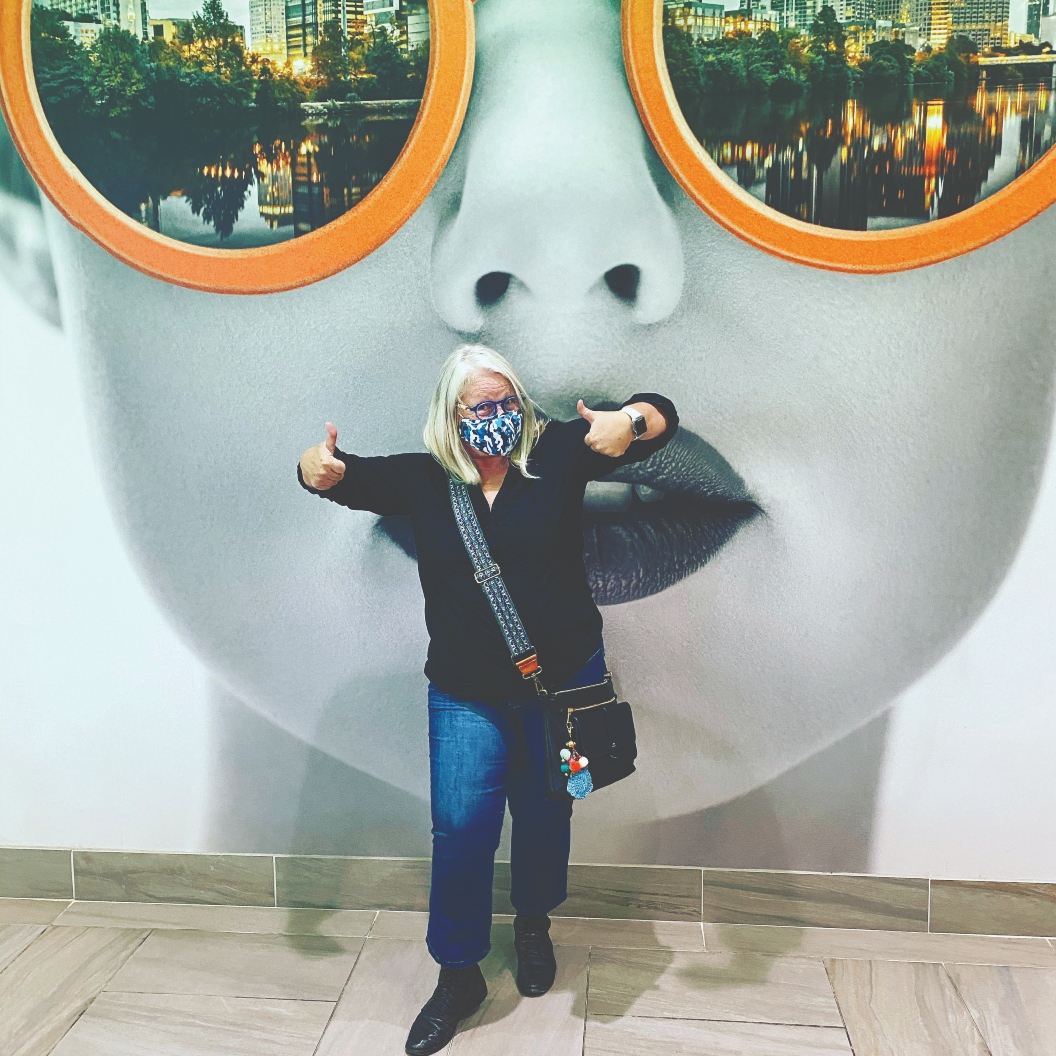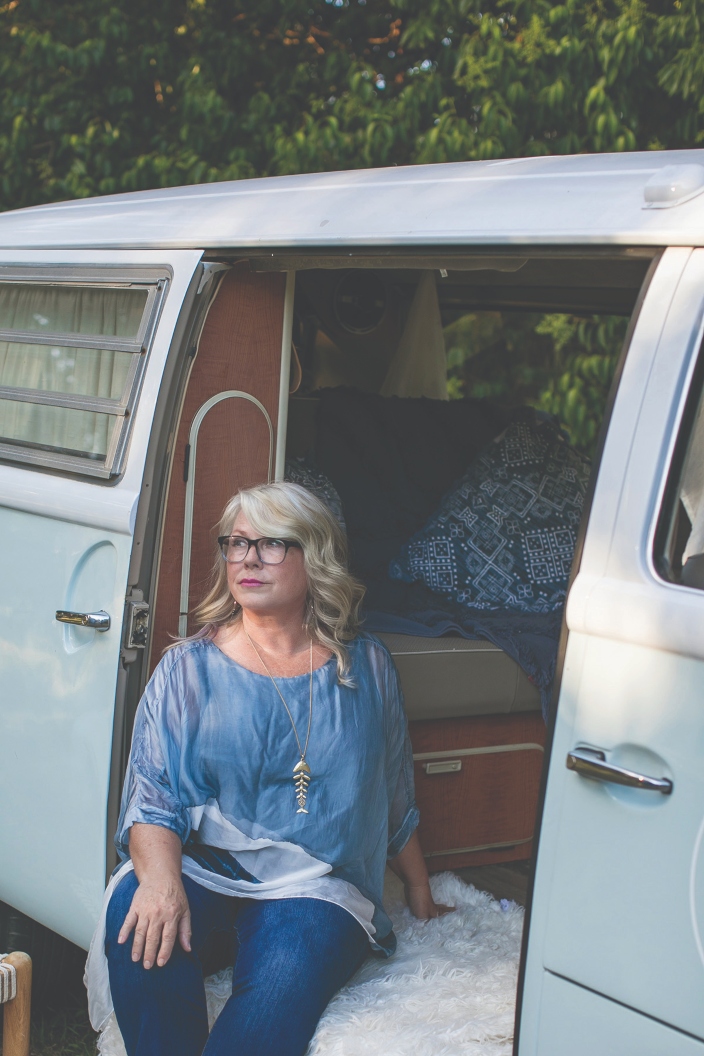Kat Albert, founder of the Lake Travis Film Festival, champions gender equality in the film industry.

By Madelyn Geyer
A radical career change: desired by many but achieved by few. After a long career in advertising, filmmaker and writer Kat Albert made her cinematic bones in her late 40s, working tirelessly to learn every job on a set. The visual nature of advertising transferred beautifully to film. She ended up in the director’s chair for numerous music videos, 12 short films and seven feature films.
Being a woman in this male-dominated industry is not for the faint of heart. Challenges she faced influenced her desire for gender parity on her sets and centering her films on mainly female characters. Albert now revels in the promethean task of bringing the artistry of independent cinema to Lake Travis, Texas, through the Lake Travis Film Festival, now in its second year. Film acts as an emotional connective tissue. Albert’s festival allows new films a platform to tell their side of the story.
Tell me about the inaugural year of the Lake Travis Film Festival.
The first festival took place the last weekend of February 2020. We were actually the last festival, that we know of, that got out before everything shut down. For the second year, we never stopped planning. We did [shift]from February to June to give ourselves more time, but we never stopped. We did everything on Zoom, and we always had faith we would be able to have another in-person festival because we knew the magic of our festival is experiential. There’s no way we could have had a good festival if it was online.
It’s an experiential event?
We don’t sell individual tickets because we don’t want you to come and just see one movie. We curate all these films, speakers, parties and one-off events that all work together. I had somebody explain to me last year that they felt like they had just gone to summer camp because you come the first day, no one knows anyone. Then by day four, everybody’s best friends. It doesn’t matter if you’re industry or you’re someone that lives in the community that just loves cinema. These connections are real.
What is your favorite experience?
I love the short showcases. There are so many short-filmmakers out there. They don’t always get a place to show their work on the big screen. I curate maybe five films together that connect thematically. Then at the end, we have a Q&A with the audience. It’s really rewarding, and it’s fun for the filmmakers.
How would you describe the aesthetic for this year?
We definitely felt like nostalgia was important because we were going into this pandemic and people were looking backwards to find comfort. We have this nostalgic lake vibe. We used actual photos of Lake Travis, and we transposed those with what we call our 1940s diving lady. Dive In has a lot of interpretations. It could mean that you’re jumping in the lake. Or it could be that you’re diving back into life because we’ve been removed from that. The fact that we’re ready to dive back in and have these experiences was meaningful.
What were the events that led you to create the festival?
…this is where we are.
We’re dealt the hand that we were dealt.
Our challenge is just to make the best use of that hand.
I know I can’t change everything,
but I can make little changes as I go along.
I’m an independent filmmaker myself. I do a lot of music videos and short films and have for the last 10 years. I have a huge front yard on 3 acres. A lot of my filmmaker friends would come out and do cast-and-crew screenings on my front lawn. People liked it, and we did it a lot. So I thought, wouldn’t it be cool to make this more official? I thought that I would go find a location that would let me pull together all my friends to show our films. But then the city got involved and we started getting funding from the city of Lakeway. Then it became a much bigger thing than I anticipated.
How did you become a filmmaker?
I came to this very late in life. When I sold my advertising business, I started thinking about what I might want to do next. I got involved in screenwriting. Someone then suggested I go back to school and learn how to make films. In the beginning, nobody probably wanted me on their set. So I learned how to run the sound because everybody always needed a sound person. I got to be on a lot of sets that way. I made my tribe and worked on other people’s projects. Then I started producing my own projects.
Many of your films, such as the documentaries Face Value and The Shame We Carry, center around women. What led you to want to tell those stories?
Face Value was so interesting. I worked with a makeup artist who liked to go to retirement homes in her free time and do makeovers for the older ladies. We just talked about it, and as we did a few interviews with them, we found that as a woman, your looks and your face, that’s kind of your currency. That currency doesn’t last forever. What does society say about how we look? I see some of these things differently now, even after coming through the pandemic. I don’t have the same feelings about makeup and putting on this facade for the world anymore. I feel more raw with how I am. I think other people are feeling that too.
In The Shame We Carry, I’m actually still working on that. I had to put it on the shelf for the film festival because it takes a lot more time than I thought it would. But it’s a really interesting project. It has a lot of “Me Too” elements in it. Some of the things that we found when we were interviewing women who were victims of sexual assault were not just how it made them feel, but the people around them. One of the big things that I found out that was disturbing but interesting was that the closest people in the women’s lives, a lot of times their mothers, were the ones who were not supportive. They said, “What were you wearing?” “I told you not to go there.” “You brought this on yourself.”
That was the story that I hadn’t seen anybody else take on. Women [are]not always supportive of other women. And we’re not always even super supportive of people that we love.

What challenges have you faced or certain things are you trying to dismantle in the film industry?
I always try to have a lot of women on my sets, but I also try to put women in roles that aren’t necessarily populated heavily by women. I love having a female gaffer or grip on my set. The whole camera department is very masculine. There’s not a lot of women directors of photography. But I have found a few women. Some of these women I found when they were still students. They’ve since came on board and worked on my sets. Now they’re out working in L.A. I love having women, not just as a producer, the director or the first AD. Having them in these other roles, I think, is super important.
Have there ever been moments in your career where you felt like you were being taken advantage of because you’re a woman?
Yeah, all the time. But, you know, this is where we are. We’re dealt the hand that we were dealt. Our challenge is just to make the best use of that hand. I know I can’t change everything, but I can make little changes as I go along.
How have you found your purpose in writing and directing?
This is my passion project. It’s the last thing that I’m doing in my life. I just turned 60, so things do change. The stamina you need to get up at 5:00 a.m. and do these really long days on set. I mean, that is a real thing. I’m trying to be more purposeful. That’s one of the reasons I sort of started moving more into documentaries because I can be more thoughtful and go at it more at my own pace.
The film festival, it just kind of happened. But it also is a passion project. We are trying to bring more women. And I’m going to be honest, we have 120 film projects there. Not 50% [are]women, but we simply didn’t get that many submissions from women. I can tell you we really try hard to find those stories. Some of our really, really great stories this year did come from women.
What do you want people who attend the festival to walk away with?
I want people to understand that we all have our stories. When somebody makes a film, they’re telling you their story in the most democratic way that you can possibly tell a story. You don’t have to be educated or cultured to go watch a film. When you come out of that film, you’ve heard someone’s story, and that’s how we make connections with one another.

